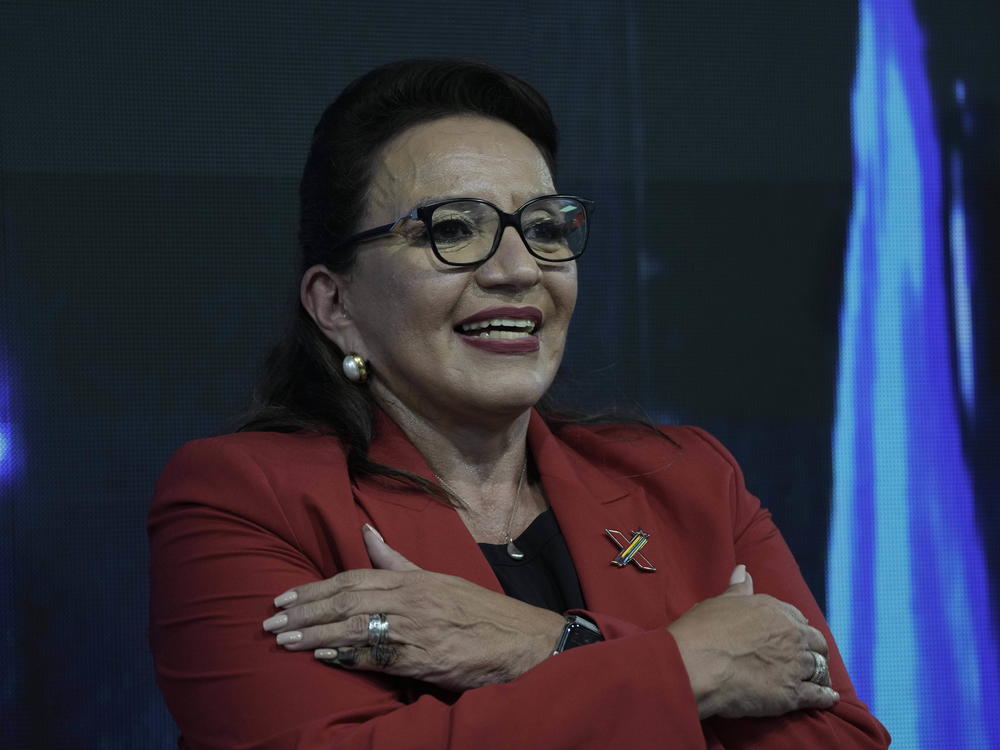Section Branding
Header Content
Leftist claims victory in Honduran vote, setting up a showdown with National Party
Primary Content
TEGUCIGALPA, Honduras — Leftist opposition candidate Xiomara Castro claimed victory in Honduras' presidential election Sunday, setting up a showdown with the National Party which said its candidate had won a vote that could end the conservative party's 12 years in power.
"We win! We win!" Castro, Honduras' former first lady who is making her third presidential run, told cheering Liberty and Re-foundation party supporters. "Today the people have made justice. We have reversed authoritarianism."
Honduras' long-ruling National Party announced on its Twitter account that its candidate, Tegucigalpa Mayor Nasry Asfura, had won.
But preliminary results released late Sunday by the Electoral Council showed that with 40% of polling tallies in, Castro had 53% of the votes and Asfura 34%. The council said turnout was more than 68%.
Thousands of people packed the capital's Morazan Boulevard blowing car horns, waving the Libre party's red flags and setting off fireworks. Approaching midnight, the street continued to fill with Castro's celebrating supporters.
Anticipating vandalism, some businesses along the boulevard had covered their windows with wood or metal sheeting, but the celebration appeared peaceful.
The National Party said it would hold a news conference Monday.
The competing claims of victory came just hours after the National Electoral Council reminded parties that such announcements were prohibited and violators would be fined. The claims raised fears of street protests and violence.
In 2017, after a protracted election filled with irregularities, protesters filled the streets and the government imposed a curfew. Three weeks later now-outgoing President Orlando Hernández was declared the winner despite the Organization of American States observation mission calling for an election re-do. At least 23 people were killed.
Late Sunday, Castro promised a permanent dialogue with the Honduran people and said beginning Monday she wanted to open conversations with all sectors of society and international organizations to seek solutions for the Central American country, which is recovering from two major hurricanes, troubled by gangs and enduring corruption and high poverty. Her husband, the former president who was ousted by a military coup in 2009, did not appear on stage with her.
Castro rode a wave of discontentment with the National Party's 12-year rule. Hernández became a national embarrassment with U.S. federal prosecutors in New York accusing him of running a narco state and fueling his own political rise with drug money. Hernández has denied it all and has not been formally charged, but that could change once he leaves office.
And many believe Hernández isn't legitimately their president. A friendly court sidestepped the constitutional ban on reelection and Hernández won a 2017 contest filled with irregularities that nonetheless was quickly recognized by the U.S. Trump administration.
In addition to a new president, Hondurans on Sunday chose a new congress, new representatives to the Central American Parliament and a bevy of local races.
Earlier, in the capital's violence-prone Reparto Abajo neighborhood, at least 200 voters remained in a line wrapping around the block waiting for their chance into Sunday evening. Polls were originally scheduled to close at 5 p.m., but the National Electoral Council and international observers called for all of those still in line to be allowed to vote.
At the gate of the Republic of Chile school an increasingly animated crowd fought over whether voting should continue.
Some shouted: "We want to vote!" Others screamed: "Time to close!" The sides appeared partisan with National Party militants wanting to stop voting and their rivals wanting it to continue.
All day long, electoral observers and the candidates called for peaceful voting and respect for the process.
Luis Guillermo Solis, Costa Rica's former president and leader of the observation mission of the Organization of American States, said late Sunday morning, "We have been in various (voting) centers already and we are seeing more or less the same, long lines of people exercising their civic right."
The council also confirmed in a statement that the webpage allowing voters to see where they were supposed to vote had been down and an initial investigation suggested an attack on the servers. Complaints about the site crashing had started Saturday.
A short drive away from the tense scene at the Chile school, voting was wrapping up peacefully in the San Pablo neighborhood.
Emily Armijo was one of the last to cast her ballot. She had come running after discovering that her voting location had changed and feared she would miss her first opportunity to vote.
Armijo, who studies medicine and nutrition, said a party and family commitments had kept her from voting until late in the day.
"I think that we need a change," Armijo said. She said too often only the bad things receive attention in Honduras. "So this action of voting today will be an opportunity to change that."
Copyright 2021 NPR. To see more, visit https://www.npr.org.
Bottom Content




